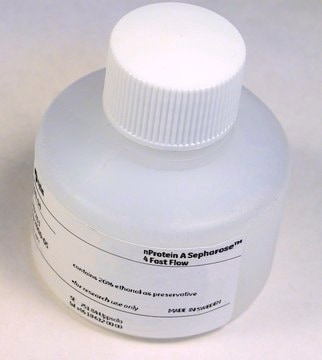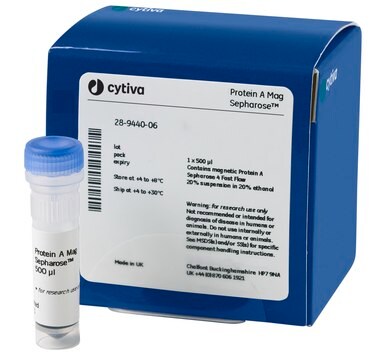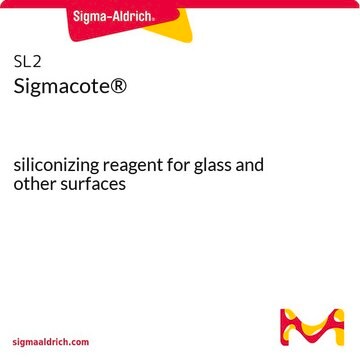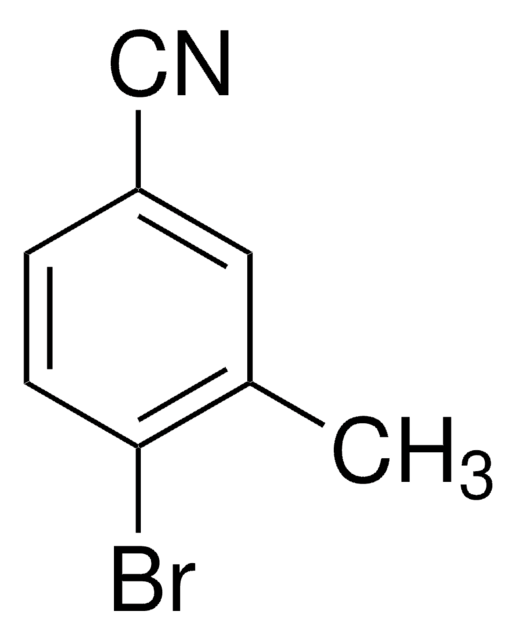GE17-5280-02
nProtein A Sepharose™ 4 Fast Flow
Cytiva 17-5280-02, pack of 200 mL
About This Item
Produits recommandés
ligand
native protein A (S. aureus)
Conditionnement
pack of 200 mL
Fabricant/nom de marque
Cytiva 17-5280-02
Conditions de stockage
(20% Ehtanol)
Matrice
4% cross-linked agarose
Diamètre moyen
90 μm (d50v)
working range
3-9
Capacité
>30 mg binding capacity(human IgG/ml)
Adéquation
suitable for bioprocess medium
Température de stockage
2-8°C
Description générale
nProtein A Sepharose™ 4 Fast Flow is native protein A coupled to the well established Sepharose™ 4 Fast Flow base matrix. The native protein A ligand is produced by fermenting a selected strain of Staphylococcus aureus. The purified protein is coupled to the cross-linked 4% agarose base matrix by the cyanogen bromide technique, giving a highly stable medium with minimal non-specific adsorption. nProtein A Sepharose™ 4 Fast Flow is manufactured without using animal-derived components.
nProtein A Sepharose™ 4 Fast Flow has nearly twice the total IgG binding capacity of Protein A Sepharose™ CL-4B, and is suitable for recovery and purification of monoclonal antibodies from cell culture at both laboratory and process scale. nProtein A Sepharose™ 4 Fast Flow was developed and tested in co-operation with leading manufacturers of purified monoclonal antibody products, and is used in routine commercial production.
As member of the BioProcess media range, nProtein A Sepharose™ 4 Fast Flow meets industrial demands with security of supply and comprehensive technical and regulatory support.
Caractéristiques et avantages
- Replaces Protein A Sepharose™ 4 Fast Flow, the first Cytiva Protein A medium for large-scale purification of antibodies.
- Used in routine commercial production of monoclonal antibodies
- Free from animal-derived components.
Remarque sur l'analyse
Informations légales
Mention d'avertissement
Warning
Mentions de danger
Conseils de prudence
Code de la classe de stockage
3 - Flammable liquids
Certificats d'analyse (COA)
Recherchez un Certificats d'analyse (COA) en saisissant le numéro de lot du produit. Les numéros de lot figurent sur l'étiquette du produit après les mots "Lot" ou "Batch".
Déjà en possession de ce produit ?
Retrouvez la documentation relative aux produits que vous avez récemment achetés dans la Bibliothèque de documents.
Articles
This page shows various purification options for Protein A Sepharose chromatography media and describes typical binding and elution conditions for Protein A Sepharose chromatography media.
This page describes immunoprecipitation (immunoaffinity or pull-down techniques).
This page describes efficient column packing and preparation for affinity chromatography of antibodies.
Desalting at laboratory scale is a well-proven, simple, and fast method that will rapidly remove low molecular weight contaminants at the same time as transferring the sample into the desired buffer in a single step.
Protocoles
This page provides information about different pull-down assays for the further isolation of multiprotein complexes to identify their components with products from Cytiva.
Protein A, coupled to Sepharose, binds IgG via its Fc regions, facilitating affinity chromatography purification.
This page shows how to separate IgG antibodies by affinity chromatography using Protein G Sepharose 4 Fast Flow from Cytiva.
This page shows how to convert between linear flow and volumetric flow rates in affinity chromatography.
Notre équipe de scientifiques dispose d'une expérience dans tous les secteurs de la recherche, notamment en sciences de la vie, science des matériaux, synthèse chimique, chromatographie, analyse et dans de nombreux autres domaines..
Contacter notre Service technique







